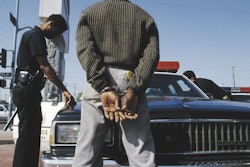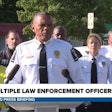One of the most difficult situations that an officer can face is a confrontation with an individual who wants to die. These extremely dangerous people fall into three primary classes: terrorists on a suicide mission, criminals who won’t be taken alive, and emotionally disturbed people who want to take their own lives and choose a police officer as their unwitting accomplice.
Certainly terrorists and “mad dog” sociopaths are a greater threat to society. But don’t think for a moment that suicidal citizens who want you to put them out of their misery are harmless. They can and will take you with them.
Since it was classified in the 1980s and became part of the American vocabulary, “suicide by cop” has been a prevalent topic of discussion in American law enforcement. The subject gets a lot of press. However, you rarely see a discussion of this phenomenon from the point of view of the street cop.
But the street cop is the real victim of this phenomenon. He or she must face the danger presented by the suicidal person, try to talk them down, and likely shoot them. Then when it’s all over, it’s the street cop who must face the accusations of excess force from the suicide’s relatives and live through the emotional and psychological trauma of taking another person’s life.
I’m not a psychiatrist. Nor am I a sociologist. I’m a cop like you. And I can tell you that my 23 years of police service qualifies me to discuss both human behavior and the tactics that you will need to survive a suicide-by-cop incident. I can also tell you that if you ever have to pull the trigger and kill one of these people, then you’re going to need some help dealing with it.
Case Studies
Before we go any further, let’s take a quick look at some suicide-by-cop cases.
In Woodbridge, N.J., a 42-year-old woman was causing a disturbance that resulted in a police response. Five officers faced the woman, who approached them and brandished a firearm. She was struck by police gunfire and died.
As in most cases, the New Jersey officers involved did not know the reason for the woman’s behavior until after the incident was resolved. Her weapon was found to be unloaded. She even left a letter to the officer who killed her. (Not a personal letter, of course, but a general “to whom it may concern” suicide note.) Her personal effects also contained letters that indicated she wished to die but was “too chicken” to accomplish the task herself.
As this incident illustrates, threatening officers with unloaded weapons is a common behavior of people who want you to help them commit suicide. Of course, an unloaded weapon is not necessarily solid evidence of a suicide. After all, even peace officers and soldiers have forgotten to load their guns.
Another common way that a suicidal individual will induce police to shoot him is by threatening other people with a gun. This should drive home to you that suicide-by-cop cases can be extremely dangerous to you and the public and that even after the subject is killed, his true intentions may never be known.
In one incident, a man was told three times to drop a rifle that he had just used to fire on a neighbor’s home. He refused and approached police, forcing an officer to shoot him. After the incident, it was discovered that the man had exhausted his ammunition and had threatened officers with an unloaded rifle. He left several rambling notes indicating a distressed state of mind.
In a case occurring in Spartanburg County, S.C., an individual brandished a shotgun in a threatening manner, forcing a sheriff’s deputy to shoot him. The shotgun was unloaded, but there were shells in the man’s pocket. Had he not been stopped, we can only wonder how the situation would have progressed.
Suicide by cop can be the result of a long-term plan, or it can result from a spur of the moment decision by a distressed person who is confronted by a law enforcement officer.
Some months ago I was involved in attempting to settle a heated domestic dispute. I was far away from backup and handled the situation by asking each participant to go to relatives’ homes to cool off. (The argument was loud but there were neither threats of violence nor a history of the same.)
My request did not meet with compliance from the man. He moved to the kitchen—a truly scary place for any cop answering a domestic—and put his hands on a large and deadly butcher knife. He started to draw the knife and said, “I wish someone would just kill me.”
I stepped back a few feet, covered my weapon, and commanded, “Take your hands off that knife or you may get your wish.”
The man sheepishly moved away, realizing the seriousness of his actions. This was an approach that I felt would work with this man. In the end, he realized that his troubles were not worth losing his life over, and I sensed that. But I also had to be ready to shoot him in case he threatened me with that knife.
Common Denominators
Suicide by cop may not be epidemic, but it is common. And you need to be prepared for it and all of its potential ramifications.
Police-assisted suicide incidents usually involve profoundly emotionally disturbed individuals. Your primary goal in this confrontation is to protect yourself and the public. Your secondary goal is to talk this person down and prevent the situation from escalating to the point that you have to shoot.
No, you’re not a mental health professional. And it would be best if one were available for this job. But let’s be honest here, you’re the first contact. If you work on a small agency, a specialist may not be available, so you’re it. If you work on a large agency, all the help in the world may be available but not on the scene and, once again, you’re it.
Use common sense. And don’t endanger yourself. Even an incident involving a seemingly rational individual can deteriorate rapidly. In other words, try to talk them down, but be ready to protect your life or the lives of innocents.
I have in my files an incident in which a man who threatened officers with a rifle was fired upon. The first round fired missed. But the man did not desist, and he was shot and killed. His rifle was found to be unloaded. Yet, even an officer firing upon him did not dissuade him. The lesson here is that sometimes you can’t talk them down.
Obey Rule Number One
You know rule number one of policing. It’s come home alive and in one piece at your shift. But no other incident will challenge your instinct to do so more than a suicide-by-cop attempt.
Remember, even if a person is known to be mentally ill, you cannot hesitate to act if he or she threatens your life. It doesn’t matter if every instinct tells you that he or she is attempting a police-assisted suicide; you cannot assume that an emotionally disturbed person who is armed will not kill you in pursuit of his or her own certain destruction.
When protecting your life and those of innocents, you should avail yourself of any cover or any tool that will buy you time to end the confrontation without bloodshed. When time permits, suicidal individuals can often be stopped with less-lethal weapons such as beanbag projectiles or stun guns. Gas canisters may even work.
But in no case should you expose yourself any more than you would when facing any other threat. You should handle a suicide-by-cop incident in much the same way as you would handle a hostage incident or standard threatened suicide attempt.
In other words, you want to contain the subject and limit his or her movement. You also want to remove innocent people from the line of fire. For example, family members who may be in danger should be moved from the area. Note: You may need to arrest them to force them to move to safety.
In order to wear down the suicidal subject’s resolve, maintain a tactical advantage. Just as in any other situation, if you and your fellow officers on the scene have a tactical advantage the situation is more likely to be resolved in your favor.
And I’ll repeat this, find cover. By maintaining cover, you shield yourself from hostile action and may be able to terminate the situation without gunfire. When available, find cover, then talk. If nothing else, use your patrol car.
Once you have cover and hopefully a tactical advantage, open the lines of communication. A hostage negotiator once told me that when we are talking we are not shooting, and this is always true.
However, don’t expect to have a conversation. The suicidal subject’s mental processes are disturbed. Also remember, despite the subject’s death wish, he or she is under extreme stress and you will be too. So keep it simple. Don’t attempt complex instructions or philosophical arguments.
The Symptoms
There’s no sure way to recognize a suicide by cop. As I’ve pointed out, sometimes you don’t know what the motivation was behind an individual’s action even after they’ve been killed.
However, there are some common denominators that you can look for that will give you an indication that you are dealing with someone who wants to die at your hand.
Often an attempt at a police-assisted suicide is precipitated by an ongoing domestic dispute. What happens is that a particularly bad incident triggers a suicide-by-cop attempt from a person predisposed to suicidal tendencies.
You should also be aware that many people who plan to commit suicide by cop want an audience. They will choose a site for their death that affords a good view to neighbors or other onlookers.
Psychological Survival
Unfortunately, many a suicide-by-cop incident ends in exactly the way the subject wants it to end. Some street cop has to end the subject’s life.
Two things happen in the aftermath. Often the community and the media make the cop out to be some kind of “trigger-happy” cowboy. And the cop has to live with the guilt.
Most suicide-by-cop subjects are not viewed by society as “bad” people, and a significant number of these people do not have criminal records. Consequently, any officer who is forced to kill a suicide-by-cop subject is going to be faced with the ultimate question from the survivors, the media, and the courts: “Why’d you have to shoot?”
Fortunately, what often happens in these cases is that the evidence of the subject’s suicidal thinking clears the officer of any charges of excessive force. Also, most suicide-by-cop cases involve more than one officer and some onlookers, so there are usually plenty of witnesses.
So you likely won’t face any charges for killing a suicide-by-cop subject. But you will face your own conscience.
No officer that I have ever met wanted to take a human life in the line of duty. But we all know we may have to. So most of us have an image in our mind of what it will be like. We think we’ll shoot the “bad guy,” someone who is attacking us or another person with deadly force.
There are moral, legal, and religious standards that justify that action. Yet most officers who are forced to take the life of even the most hardened criminals suffer psychologically for their actions. Killing an “innocent” mentally disturbed individual even if they wanted you to do it is even tougher on the psyche.
Some suicides who force cops to kill them leave messages for the officers telling them that they really wanted to die and forgiving the cops for shooting them. But such notes are usually little comfort to the officers.
The best psychological survival tool for an officer who is forced to kill a suicidal person is counseling. A trained therapist can help the officer gain control of his or her feelings over the incident and help them cope with it.
Suicide by cop is a danger to the physical and mental well-being of every cop on the street. You should know what to do when confronted by a suicidal subject. Most of all, you should never assume that a suicide doesn’t want to hurt you. That assumption can get you killed.
R.K. Campbell has 23 years of experience in law enforcement. He holds a degree in criminal justice and has served in most police capacities.
Don't Go With Them
One of the most difficult situations that an officer can face is a confrontation with an individual who wants to die. These extremely dangerous people fall into three primary classes: terrorists on a suicide mission, criminals who won’t be taken alive, and emotionally disturbed people who want to take their own lives and choose a police officer as their unwitting accomplice.












